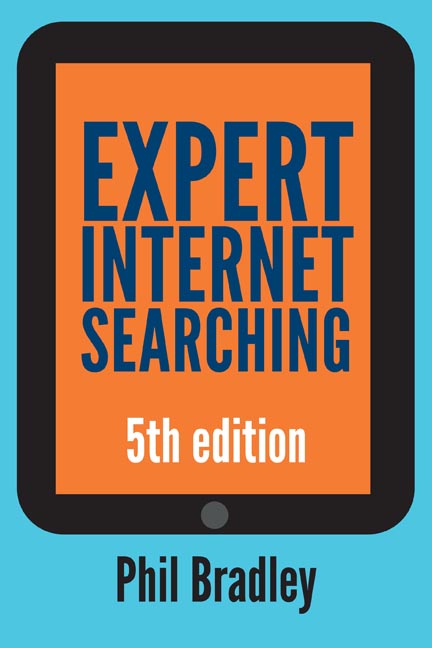Book contents
- Frontmatter
- Contents
- List of figures
- Preface
- Acknowledgements
- 1 An introduction to the internet
- 2 An introduction to search engines
- 3 The world according to Google
- 4 Other free-text search engines
- 5 Directory, clustering and similarity search engines
- 6 Multi- and meta-search engines
- 7 Social media search engines
- 8 Visual and image search engines
- 9 People-based resources
- 10 News-based search engines
- 11 Multimedia search engines
- 12 Specialised search engines
- 13 Hints, tips and the future
- Index
6 - Multi- and meta-search engines
Published online by Cambridge University Press: 09 June 2018
- Frontmatter
- Contents
- List of figures
- Preface
- Acknowledgements
- 1 An introduction to the internet
- 2 An introduction to search engines
- 3 The world according to Google
- 4 Other free-text search engines
- 5 Directory, clustering and similarity search engines
- 6 Multi- and meta-search engines
- 7 Social media search engines
- 8 Visual and image search engines
- 9 People-based resources
- 10 News-based search engines
- 11 Multimedia search engines
- 12 Specialised search engines
- 13 Hints, tips and the future
- Index
Summary
Introduction
We don't know how many search engines are available on the internet, but we can be certain that there are plenty more than we're aware of. As you have already seen, and will continue to see in the course of reading this book, there are plenty of options available to a searcher. Given that they all have their own advantages and disadvantages there's little point in just sticking to one. However, to go from one search engine to another and then another is going to be time-consuming and confusing, so while we might all agree that it's probably not best practice to just go to just one engine, it's understandable.
However, there's a type of search engine that helps us to overcome that problem, though if I'm being strictly accurate it's one type of engine with two variations: multi-search and meta-search. A multi-search engine can perhaps best be described as a search engine that doesn't actually run searches itself, but provides searchers with the ability to search a number of other engines from a portal or launch pad page. A meta-search engine, on the other hand, will take a query, pass it onto other search engines on behalf of the searcher, take the results that are returned, de-duplicate them and provide a single list of results.
There are many advantages to using this type of search engine. They can save users a lot of time, since results are generally returned more quickly with a single mouse click instead of the searcher typing in one search engine address after another, visiting, and then re-running the same search. Secondly, they're a good way to really highlight which results all the search engines think are the best, rather than relying on one engine to do that job for you. Thirdly, they're an excellent reminder to searchers that there's more to life than Google, and it's a good way to introduce them to others. Finally, because the searcher is interrogating a search engine via a third party, the engine can't personalise results, since it doesn't know who they are for.
Information
- Type
- Chapter
- Information
- Expert Internet Searching , pp. 101 - 110Publisher: FacetPrint publication year: 2017
